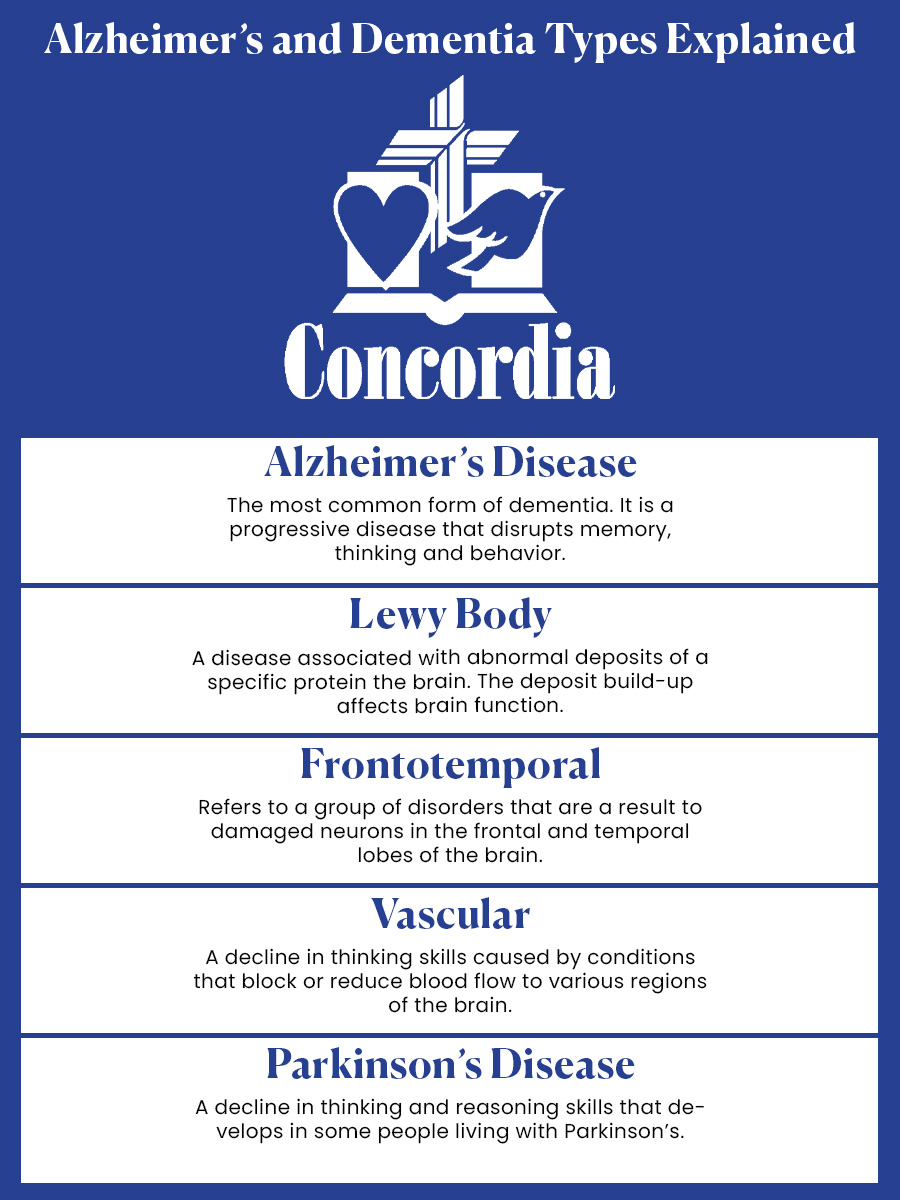Alzheimer’s and Dementia Types Explained

June is Alzheimer’s and Brain Awareness Month and an opportunity to talk about Alzheimer’s and other types of dementias. While Alzheimer’s is the most common form of dementia, the two terms are often used interchangeably and actually have different meanings. Alzheimer’s is a specific brain disease whereas dementia is a not a specific disease but rather a term to describe a wide range of symptoms that affect the brain.
According to the World Health Organization, there are currently 55 million people living with dementia and an estimated 10 million cases are diagnosed each year. Dementia is a group of conditions that result in a deterioration and loss of at least two cognitive functions. These functions can include a person’s thinking ability, memory, reasoning, judgement, emotions and social skills. Dementia is progressive and while it is certain a person’s abilities will deteriorate over time, the speed of the progression is unique to the individual and the type of dementia they are diagnosed with. Join us as we list and describe the most common types of dementia below.
Common Types of Dementia
Alzheimer’s Disease – The most common type of dementia, Alzheimer’s is a progressive disease that typically begins with mild memory loss that disrupts a person’s daily life. In addition to the impact on memory, the disease also affects a person’s thinking and behavior.
According to the Alzheimer’s Association, the disease affects people in unique ways, and each individual can progress through the stages differently. As the disease progresses, a person will find challenges with solving problems, completing once familiar tasks, problems with language and confusion with time and place.
Alzheimer’s disease is most common in people over 65 years old. While heredity plays a role, increasing age is the greatest known risk factor.
Related: Tips for Handling a Dementia or Alzheimer’s Diagnosis
Frontotemporal Dementia – A common cause of dementia, the term frontotemporal dementia (FTD) refers to a group of disorders that cause nerve damage to the brain’s frontal and temporal lobes. It can affect a person’s behavior, personality, language and body movement.
For many who are diagnosed, symptoms typically start between ages 40 and 65, but FTD can occur at any age. While the cause of FTD is unknown, researchers have discovered that some people with the disease have tiny structures in the brain cells called Pick bodies. Pick bodies are caused by an abnormal amount of, or malfunctioning, proteins.
Lewy Body Dementia – One of the more aggressive forms of dementia, Lewy Body Dementia (LBD) is progressive and affects memory and judgement along with mobility challenges. LBD leads to an overall decline in thinking, reasoning and independent function and can cause spontaneous changes to a person’s attention and alertness. One of the first symptoms a person with LBD experiences is recurrent visual hallucinations, occurring in up to 80% of documented cases.
LBD presents similarly to Parkinson’s disease, with shared symptoms such as muscle rigidity, shuffled walking, tremors or shaking, balance issues and a loss of coordination. LBD typically affects people over the age of 50 and males are more likely to develop the disease.
Related: How to Detect Early Signs of Dementia
Vascular Dementia – A decline in thinking caused by a variety of conditions that restrict or block blood flow to the brain, vascular dementia is the second most common type of dementia. While symptoms can overlap with other dementias, the most significant symptoms affect problem solving and thinking skills rather than memory loss. Confusion, difficulty concentrating, inability to organize thoughts and slowed thinking are common symptoms.
Vascular dementia is more common in individuals who have atherosclerosis (hardening of arteries, heart diseases and history of stroke), with increasing age being the number one risk factor. Lifestyle can attribute to the diagnosis, with cigarette smoking, high blood pressure, lack of physical activity and obesity being other common risk factors.
Related: Alzheimer’s Awareness Month: The Value of a Healthy Brain in Prevention
Parkinson’s Disease Dementia – The average person with Parkinson’s disease could develop the associated dementia within 10 years of its onset; however, some develop this dementia as early as one year after diagnosis. Much like the other dementias referenced in this article, individuals commonly report symptoms related to changes in memory, concentration and judgement, with more specific symptoms such as muffled speech, visual hallucinations and difficulty understanding visual information.
Both Parkinson’s disease and Parkinson’s disease dementia cause damage to brain cells and will worsen over time. While the cause is currently unknown, clinical research has shown that a large build-up of a specific protein clump together to form Lewy bodies. The average onset for Parkinson’s disease is between ages 50 and 85.
Getting Help for Your Loved One
If you are noticing a gradual decline in the cognitive function of a loved one, the team at Concordia is here to help. We offer many memory care services throughout our organization, with specialized programs at Concordia at Villa St. Joseph, Concordia of Fox Chapel, Concordia of the South Hills and at Concordia at Cabot’s Adult Day Services.
Related: How Adult Day Services Support Family Caregivers
For more information about all of the levels of care Concordia offers in Western Pennsylvania, Eastern Ohio and Tampa, Florida, including memory care services, visit our care levels page or send us a message through our contact form.
Founded in 1881, Concordia Lutheran Ministries is a faith-based, CARF-accredited Aging Services Network and recipient of the inaugural Pennsylvania Department of Aging Excellence in Quality Care Award. As one of the largest nonprofit senior care providers in the country, the organization serves 50,000 people annually through in-home care and inpatient locations in western Pennsylvania, eastern Ohio and Tampa, Florida.
Get Updates From Concordia
There is always a LOT happening at Concordia! Would you like to stay up-to-date with our news and events? Sign up for our monthly e-newsletter here.